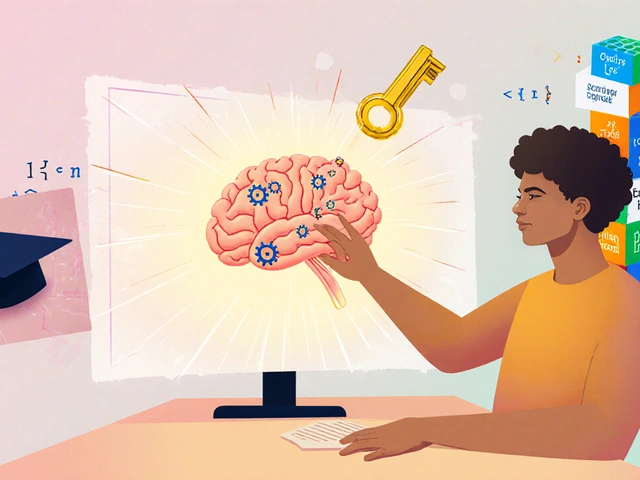With the world rapidly going digital, the need to acquire coding skills is more relevant than ever. Fortunately, we live in a time where self-learning is not only feasible but also incredibly rewarding. However, teaching yourself to code can seem like a daunting task at first. The key is to break down complex concepts into manageable chunks, stay consistent, and utilize resources that cater specifically to beginners.
This guide aims to illuminate the path of a self-taught coder. From understanding basic programming principles to choosing the language that appeals most to your goals, and finding the right resources—everything is covered here to ensure you embark on your coding journey fully equipped and confident.
- Understanding the Basics of Programming
- Choosing Your First Programming Language
- Essential Resources for Self-Learners
- Effective Learning Strategies and Tips
- Building Practical Projects
- Staying Motivated and Inspired
Understanding the Basics of Programming
Embarking on the journey to learn coding starts with grasping the fundamental concepts that lay the foundation for all programming languages. At its core, programming is the art of turning ideas into instructions that computers can execute. It involves not just writing code but developing a logical approach to solving problems. Before delving into the myriad of codes and syntax that constitute different programming languages, understanding the computational thinking process is essential. This type of thinking breaks down complex problems into simpler, manageable parts, a skill that serves well not only in programming but in life itself.
Almost every program, regardless of the language, relies on a few fundamental principles: variables, data types, control structures, syntax, and a good understanding of algorithms. These are the building blocks of any program you write. Variables act as storage locations, holding data that can be manipulated. Different languages have different data types, like integers, strings, and booleans, each serving a specific purpose. Control structures, including loops and conditionals, guide the flow of execution, allowing programs to make decisions and repeat actions until conditions are met.
Algorithms, often considered the heart of programming, are step-by-step procedures or formulas for solving problems. Creating efficient algorithms means your program runs faster and more efficiently. As Steve Jobs famously said,
"Everybody in this country should learn to program a computer... because it teaches you how to think."This highlights programming's intrinsic value beyond the technical aspect; it's about enhancing cognitive abilities. Syntax, on the other hand, is akin to grammar in natural language—it dictates the arrangement of symbols, keywords, and structure required to form valid commands in a language. Understanding these basics helps in debugging and perfecting code.
A fascinating statistic from the Bureau of Labor Statistics suggests that jobs in software development are projected to grow 22% from 2020 to 2030, much faster than average for all occupations. This growth underscores the importance of programming as a skill in today's job market. Knowledge of programming isn't limited to IT fields; it’s becoming valuable in domains like data science, artificial intelligence, and even in creative industries. Therefore, an early understanding of the foundational concepts not only prepares one for specialized learning but also enhances adaptability across various fields requiring technical precision.
Choosing Your First Programming Language
When starting your journey to learn coding, one of the most critical decisions you'll make is choosing your first programming language. This choice can influence your learning experience, your attitude towards programming, and the ease of transitioning to other languages in the future. There are multiple languages available, each with its strengths and weaknesses. Determining which one to start with requires assessing your goals and interests. If your aim is to dive into web development, for instance, languages like JavaScript and HTML/CSS are essential, while for those interested in data science, Python stands out as the most favorable choice due to its simplicity and comprehensive library support.
An essential fact to consider is that each programming language is designed with particular applications in mind. Python, for instance, is renowned for its readability and is widely used in data analysis, machine learning, and backend web development. Meanwhile, for those focused on mobile app development, Swift for iOS or Java for Android development might be more appropriate choices. It is noteworthy that Python is often recommended for self-taught coders because of its easy-to-understand syntax. This allows beginners to focus on learning fundamental programming concepts rather than being bogged down by complex syntax.
To make an informed decision, it is crucial to understand the demand and growth prospects associated with different programming languages. For instance, a statistical survey by Stack Overflow indicates that JavaScript has been the most commonly used language for years, owing to the expansion of web platforms. JavaScript offers a solid community support and extensive frameworks like React and Angular that make web solutions robust and scalable. On the other hand, Python's role in the rise of artificial intelligence and machine learning highlights its growing importance in the industry.
“Choosing a starting language should be based on your career goals, the projects that inspire you, and the industries you wish to venture into.” – this principle from industry experts suggests that aligning your language choice with personal aspirations will lead you to more engaging and relevant coding projects.
Another approach is to sample different languages to see which one resonates with you. Trying out a bit of Python, Java, or C++ via online platforms can reveal your preferences in terms of language style and applicability. While some might find the logical structure of Python appealing, others may find the object-oriented architecture of Java more intuitive. Remember, the first language you choose is not your last. Many programmers successfully transition to different languages once they've learned the coding concepts with one language. Therefore, there's a freedom and flexibility in your first language choice, which can ease the pressure of making the 'perfect' pick.
In conclusion, the journey of a learn coding enthusiast can significantly increase in excitement once you've chosen the appropriate language that aligns with your goals. The key is to start with a language that excites you and keeps you motivated. Whether you're targeting web development, software engineering, or data science fields, remember that picking a language is just the start. Stick with it long enough to master the basics and projects, and your journey in the technological realm will always offer new challenges and rewards.

Essential Resources for Self-Learners
Diving into the world of coding on your own is both exciting and challenging, but thankfully, the modern internet era furnishes us with ample resources to assist in becoming a proficient self-taught coder. The variety of resources available is immense, ranging from free online courses to interactive platforms that can aid in honing your coding skills. To make the most of these, it’s important to understand which tools align best with your objectives and learning style.
The foremost stop for most budding coders is online educational platforms. Websites like Coursera and edX provide courses from top universities worldwide, featuring everything from introductory programming to advanced machine learning topics. Khan Academy also offers easy-to-digest tutorials perfect for those starting from scratch. An important note is that many of these platforms offer free trials or completely free courses, allowing you to explore various languages and techniques without a financial commitment. When choosing which courses to take, consider the syllabus and how it aligns with your skills and interests.
Interactive coding platforms such as Codecademy and FreeCodeCamp are fantastic for experiential learners who thrive through doing rather than just listening and reading. These websites provide hands-on coding exercises that immediately apply the concepts you've learned. For those pursuing web development, sites like The Odin Project offer wonderfully structured curriculums that guide you through comprehensive real-world projects. Not to mention, peer communities within these platforms offer a place to ask questions, share knowledge, and connect with fellow self-taught coders.
An insightful thought by Steve Jobs perfectly resonates with self-learning: "Everyone in this country should learn how to program a computer because it teaches you how to think." This philosophy underscores the importance of online tutorials that are not just about learning to code but also about problem-solving and logical thinking.
A plethora of books have also stood the test of time as invaluable companions for self-learning. Titles like "Automate the Boring Stuff with Python" by Al Sweigart and "Eloquent JavaScript" by Marijn Haverbeke are celebrated for their practical and engaging approach to coding. These books often blend theoretical knowledge with practical exercises, which further empowers self-driven learning. It's advisable to complement your digital learning with physical books that you can reference at any time, providing a break from screen time and offering a deeper dive into programming concepts.
| Resource | Type | Description |
|---|---|---|
| Codecademy | Interactive Platform | Learn to code interactively with real-time examples. |
| Coursera | Online Courses | Courses from universities in various subjects including programming. |
| "Automate the Boring Stuff with Python" | Book | A practical guide to using Python for automation and programming. |
Finally, don’t underestimate the power of communities and forums like Stack Overflow and GitHub. These platforms not only offer solutions and code snippets for every imaginable programming problem but also allow you to contribute and learn from the coding experiences of others. Engaging with these communities can dramatically enhance your coding journey, keeping you abreast of industry trends and often providing new perspectives on projects you’re working on.
Effective Learning Strategies and Tips
Embarking on the journey to learn coding on your own can be incredibly fulfilling. However, it's essential to employ effective strategies to maximize your learning experience. One of the crucial aspects is setting clear, achievable goals. Break down your ultimate objective into smaller, digestible tasks that you can tackle daily or weekly. This approach not only prevents being overwhelmed but also provides a sense of accomplishment with each milestone reached. Consider setting a schedule, dedicating specific hours each day to immerse yourself in learning. Over time, you'll find that consistency beats intensity every single time.
Diversifying your learning resources is another strategy worth considering. Relying solely on books or video tutorials might not be sufficient. Instead, mix different media like interactive coding platforms, podcasts, blogs, and even social media forums. Engage with the coding community on platforms such as Stack Overflow or GitHub, where you can ask questions and receive guidance from experienced programmers. This engagement also exposes you to different problem-solving approaches and practical knowledge shared by peers worldwide.
To truly master coding, it's vital to put theory into practice regularly. Start by replicating small projects you come across during your learning process. As you grow more confident, challenge yourself by undertaking more complex projects that require a combination of learned skills. The act of building not only reinforces your understanding but also hones your problem-solving abilities. Document your progress and reflect on what you've learned; this habit encourages continuous improvement and adaptability, crucial traits for any successful programmer.
Coding is a craft; just as poets write tirelessly to perfect their work, so must coders find joy in embracing the repetition, quoted from renowned author and technologist, Cathy O'Neil.
Many self-taught coders find study groups or mentors indispensable. Joining a study group or finding a mentor allows you to learn collaboratively and gain insights from others' experiences. Platforms such as Meetup or LinkedIn can connect you with like-minded individuals or professionals open to sharing their expertise. Additionally, having periodic discussions with a mentor can provide invaluable feedback and guidance tailored to your learning journey.
Lastly, remembering to balance learning with rest and leisure is crucial. While immersing yourself in coding is important, long hours without breaks can lead to burnout. Make sure to schedule time for hobbies and relaxation. This downtime refreshes your mind, reduces stress, and sometimes delivers those 'aha' moments when solutions often emerge from the subconscious.

Building Practical Projects
Diving into coding through practical projects is one of the most effective ways to reinforce what you’ve learned and to give your self-taught coder portfolio a boost. In the process of building real-world applications, you not only solidify your understanding but also learn how different coding concepts interact in a larger system. This hands-on approach is invaluable; it simulates how problems are solved in professional coding environments where theory meets practice.
Start small and scale up. Begin with mini projects like a simple calculator or a basic to-do list app. These projects are excellent for getting familiar with loops, conditionals, functions, and arrays in a manageable setting. As you gain confidence, gradually take on more complex projects like a personal website, an interactive game, or a dynamic web application. During this phase, keeping a clean codebase, documenting your journey, and maintaining version control are all skills worth honing. An added advantage is that each project becomes a part of your portfolio, demonstrating your increasing expertise in coding.
To ensure your projects reflect real-world usage, it’s crucial to think like a user. Design user-friendly interfaces, anticipate usability issues, and incorporate feedback, which are all part of a coder's job in professional settings. Using libraries and frameworks like React, Vue, or Django can help you build more sophisticated applications. Don’t forget about libraries like Bootstrap for front-end design, which allows you to learn as you style your applications.
According to a survey by Stack Overflow, developers who engage in practical projects outside of just their studies tend to have a higher job satisfaction rate. This engagement not only solidifies knowledge but also allows for creativity in problem-solving, something that’s highly valued in tech industries.
Moreover, leverage the open-source community. Platforms like GitHub are treasure troves where you can find a multitude of open-source projects. You might want to contribute to these projects once you feel comfortable, as it could be a great way to learn from seasoned developers and show your skills. Building practical projects through collaboration can be an enjoyable and enlightening journey.
“Learning to write programs stretches your mind, and helps you think better, creates a way of thinking about things that I think is helpful in all domains.” — Bill Gates
If you aren't sure where to start, look for project ideas online or enroll in coding challenges and hackathons. Websites like LeetCode or HackerRank provide coding challenges that could spark ideas or offer insight into what kind of problems you might face in the future. This proactive approach ensures that the skills you acquire are not just theoretical but applicable in live scenarios.
| Project Type | Description |
|---|---|
| Basic Calculator | Great for learning basic arithmetic operations, conditionals, and loops. |
| To-Do List | Focuses on input handling, data storage and retrieval on the local system. |
| Personal Website | Involves styling, front-end development, and personal or professional branding. |
Staying Motivated and Inspired
Embarking on the journey to become a self-taught coder often feels like climbing a mountain, and staying motivated is crucial to reaching the summit. The first step in maintaining your drive is setting clear, achievable goals. Break down your learning process into manageable milestones, and celebrate each accomplishment, no matter how small. These tangible progress markers fuel your enthusiasm and provide a sense of direction. Imagine each step as laying a brick in the foundation of your coding knowledge, steadily building toward a grand structure.
Another key element is surrounding yourself with a supportive community. Engaging with fellow learners and experienced coders can inject fresh energy and perspectives into your learning process. Joining online forums, participating in coding challenges, and attending tech meetups are excellent ways to connect. These interactions not only offer support but also expose you to new ideas, keeping your learning dynamic and engaging. As noted by Steve Jobs, "Great things in business are never done by one person; they're done by a team of people." This notion aligns with the collaborative spirit of the coding community, highlighting the importance of collective knowledge-sharing.
To further nourish your inspiration, don't hesitate to delve into real-world projects that ignite your passion. Whether it's developing a game, creating a personal website, or building a useful app, practical application of your skills reinforces your learning and stokes your creative fire. By working on projects you're genuinely interested in, you experience the thrill of problem-solving and innovation firsthand, which is a powerful motivator. The sense of ownership and accomplishment derived from completing such projects inspires continuous learning.
Maintaining a balanced mindset is equally vital. It's easy to get discouraged when progress seems slow, but remember, every coder was once a beginner. Embrace the challenges as opportunities to grow rather than obstacles. Practicing consistency can transform learning into a habit. Dedicate a specific time each day for coding and stick to it diligently. Over time, these small, consistent efforts will compound into significant progress. Adopting this mindset shifts your focus from immediate results to long-term growth, reducing pressure and enhancing learning satisfaction.
Incorporating periodic reviews of your journey can also reinforce motivation. Reflect on how far you've come, the skills you've acquired, and the hurdles you've overcome. This retrospective view provides valuable insights and renews your commitment to your goals. Writing down these reflections creates a personal record of your journey, serving as a motivational tool during moments of doubt.
An additional method is tapping into the wealth of inspiration available through stories of successful self-taught programmers. Many renowned programmers started as hobbyists and paved their way to success through perseverance. Their stories offer not only inspiration but also valuable lessons on navigating the challenges of self-learning. These narratives validate your journey's potential and encourage you to push through temporary setbacks.


